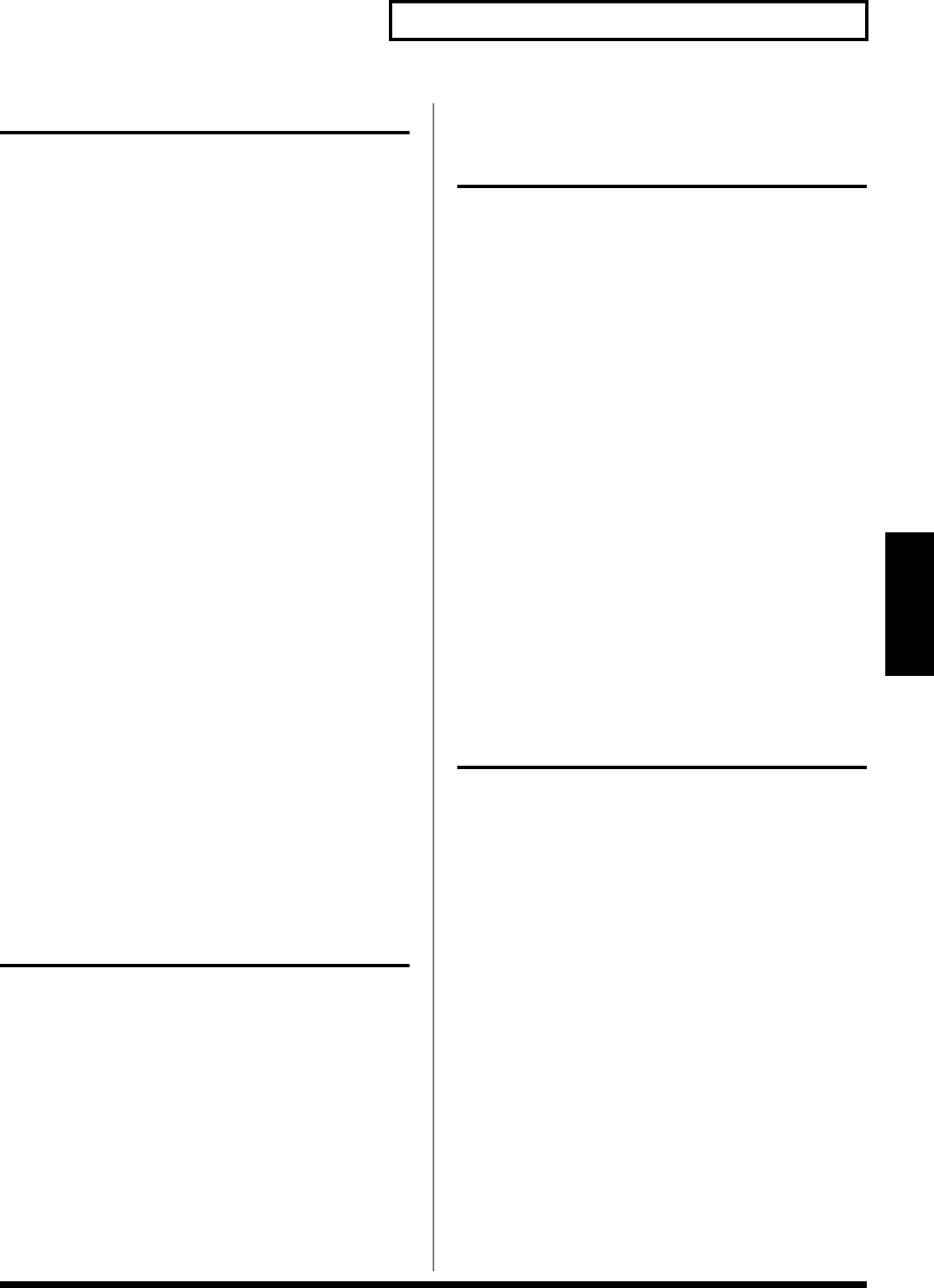
103
Troubleshooting
Appendix
Effects not being applied correctly
Are the master effects switches set to OFF? (p.
65)
Are the Chorus settings correct?
Check the Chorus Level (p. 86), Chorus Depth (p. 87), and
Chorus Send Level (p. 46, p. 58) settings.
Are the Reverb settings correct?
Check the Reverb Level (p. 87) and Reverb Send Level (p. 46, p.
58) settings.
Are the Chorus or Reverb settings for the
rhythm set correct?
Check the Chorus Send Level (p. 53) and Reverb Send Level (p.
53) settings for each note of the rhythm set.
Is any Multi-Effects switch set to “BYPASS?”
Set the Multi-Effects switch for the part being used to ON (p. 46,
p. 58).
Are the Multi-Effects Source setting correct? (p.
56)
Is the Clock Source set to “MIDI?”
If you set the clock source (p. 89) to “MIDI,” some of the effects
that are synchronized with the tempo will not work. Set the
clock source to “INT” except when you want to synchronize the
JUNO-D with an external MIDI device.
Is the Tone Delay time value set to the note?
There is a maximum permissible value for the Delay Time
parameter for such as 17: St DELAY. So, if the time setting is
specified in terms of a note value, and the tempo is slowed
down, this maximum permissible value will be reached, and it
cannot be increased further.
The upper time limit for each is the maximum value that can be
set other than the numerical value for the beat.
Effect control does not work
If you are using the [C1]/[C2]/[C3] knobs in Performance mode
to control MFX PARAMETER settings, the
“MFX Source”
(p. 56)
setting will determine the part whose effect will be controlled.
If MFX Source is set to “Part1–16,” the effect of that part will be
controlled.
If MFX Source is set to “PERFORM,” the System
“Perform Ctrl
Ch (Performance Control Channel)”
(p. 90) setting will
determine the part whose effect will be controlled. If this setting
is “OFF,” no effect will be controlled.
Notes are delayed or unsteady
during playback a song from
an external sequencer
The JUNO-D contains some patches that are intended for live
playing in Patch mode; these include tones that use four voices for
each note, or patches that use the Dual function to produce rich
sounds. If you are using the JUNO-D as a multitimbral sound
module, playback may be smoother if you avoid using such sounds,
and instead choose sounds that use fewer voices.
• Refer to
“Patch list”
(p. 111), and switch to patches that use
tones with fewer voices.
• Select patches whose KEY MODE is other than “DUAL.”
• If the number of notes you are attempting to play
simultaneously is significantly greater than the maximum
polyphony, reduce the number of note messages in the data.
• In some cases, you may be able to lighten the load of multiple
notes by shortening the release of patches used in sections where
the data is especially dense.
If you playback a song that contains an extremely large amount of
data, notes may be delayed or unsteady during playback. This
problem can also occur if the tempo is speeded up excessively.
• Delete unneeded note data or knob data from the song.
• Move notes that were input at the same location as chords, so
that they are staggered slightly.
• Move data of parts other than the rhythm part slightly forward
or backward.
Song data cannot be played
back correctly
Did you start playback at some point other
than the beginning of the song?
Songs meant for playback with General MIDI System and General
MIDI 2 System sound generators have a GM/GM2 System On
message recorded at the beginning of the song. If this message is
not received, the song data may not play back correctly.
Are you playing back data whose format is
something other than General MIDI 2 or
General MIDI?
The sound generator of the JUNO-D conforms to General MIDI 2
system. It is not compatible with song data that uses formats
other than General MIDI 2 or General MIDI.
JUNO-D_e.book 103 ページ 2004年6月11日 金曜日 午後1時21分


















